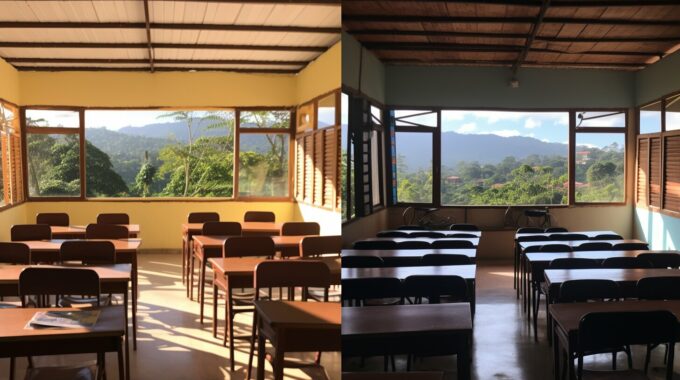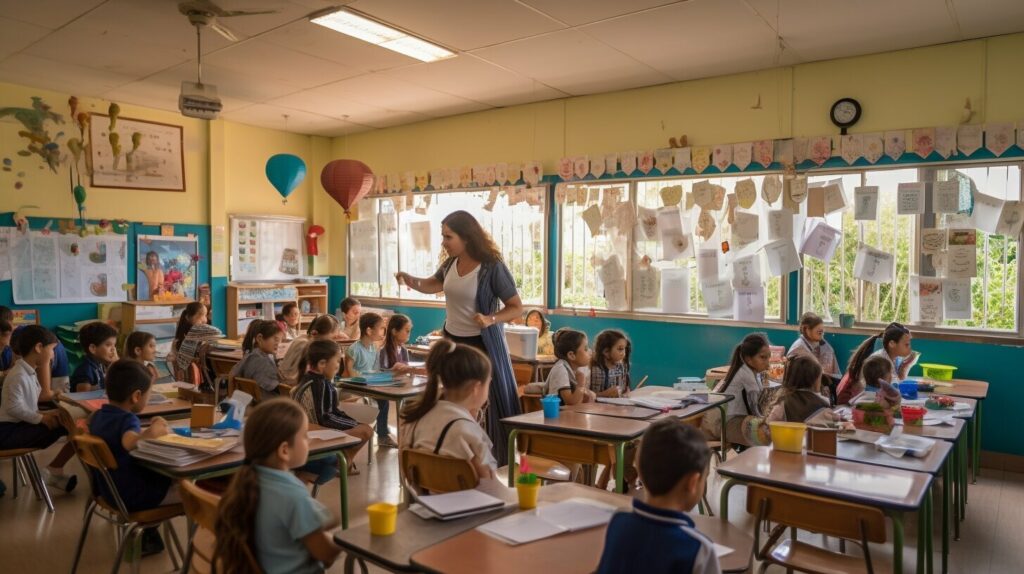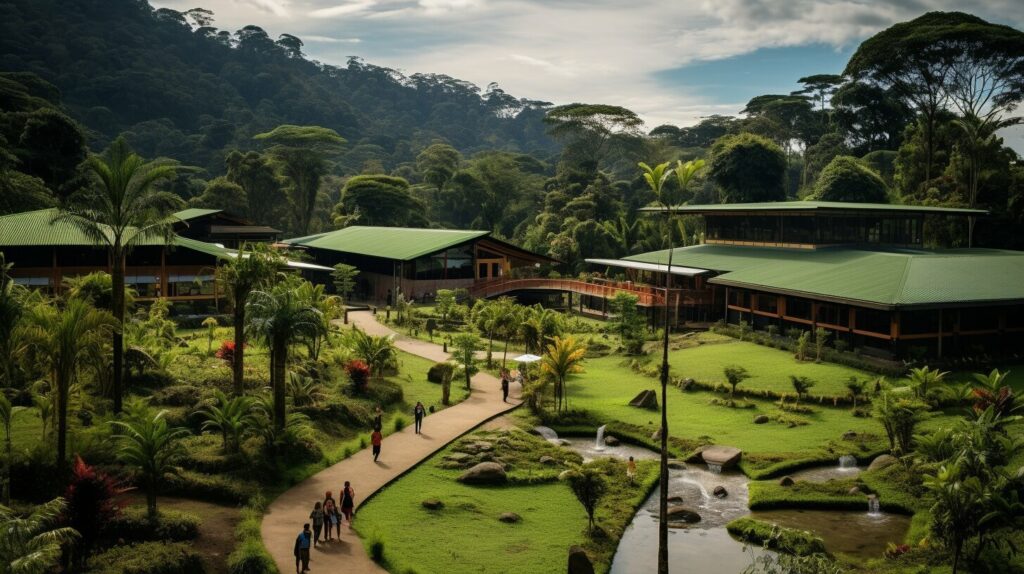At the forefront of property financing in Costa Rica, GapInvestments.com stands as a beacon for…

Exploring Public and Private Education in Costa Rica
Costa Rica offers a diverse education system with both public and private schools, ensuring that students have access to quality education. The country’s education system is highly valued and renowned for its emphasis on practical skills development. With a commitment to equal opportunities, Costa Rica strives to provide a quality education for all students, irrespective of their background or financial means.
Public schools in Costa Rica are funded by taxes and provide free education to all students. They offer a quality education, including extracurricular programs and a sense of community. However, public schools may face challenges such as limited resources, teacher turnover, bureaucratic issues, and overcrowded classrooms.
On the other hand, private schools in Costa Rica provide smaller class sizes, more extracurricular activities, and better resources and technology. They offer a supportive learning environment and often have more staff to provide additional support to students. While private schools have higher tuition fees, they can offer additional benefits such as meals and transportation services.
Both public and private schools in Costa Rica follow a standardized curriculum. Education is mandatory from preschool through secondary school, with specialized tracks available at the secondary level based on students’ interests and career goals.
Costa Rica’s strong commitment to higher education is reflected in its numerous public and private universities that offer a wide range of degree programs. Expats moving to Costa Rica have the option of enrolling their children in public, private, or international schools, depending on their preferences and resources.
Key Takeaways:
- Costa Rica has a diverse education system with both public and private schools.
- Public schools in Costa Rica are funded by taxes and offer free education.
- Private schools in Costa Rica offer smaller class sizes, more activities, and better resources.
- Both public and private schools follow a standardized curriculum.
- Costa Rica is committed to higher education, with many universities offering a wide range of degree programs.
Public Education in Costa Rica
Public schools in Costa Rica play a vital role in providing quality education to students, with their funding primarily coming from taxes and offering free education to all. These schools offer a comprehensive curriculum that is designed to meet the educational needs of students from preschool through secondary school. The emphasis is on developing practical skills and preparing students for future careers.
Despite the challenges they face, such as limited resources and overcrowded classrooms, public schools in Costa Rica strive to provide a nurturing learning environment. They offer a range of extracurricular programs, including sports, arts, and clubs, to foster students’ holistic development. Community involvement is also encouraged, with parents and community members actively participating in school activities and events.
“Public schools are the backbone of Costa Rica’s education system, ensuring that every child has access to quality education,” says Maria Rodriguez, a Costa Rican education reform advocate. “Although there are challenges, the dedication of teachers and the commitment to equal opportunities make public schools an important part of our society.”

Bilingual education is an integral part of the Costa Rican education system. The country values the importance of English proficiency and offers bilingual programs in many public schools. These programs aim to equip students with the language skills needed to thrive in an increasingly globalized world.
Bilingual education in Costa Rica faces some challenges, including a shortage of qualified English teachers and a lack of resources. However, the government is actively working on addressing these issues and implementing reforms to improve language education in public schools. There are also initiatives in place to support English-language teacher training and provide additional resources and materials for bilingual classrooms.
“Bilingual education opens doors for our students and prepares them for a future in which language skills are in high demand,” says Carlos Fernandez, a language education specialist in Costa Rica. “By investing in bilingual programs and supporting language teachers, we can provide our students with the tools they need to succeed globally.”
| Advantages of Public Education in Costa Rica | Disadvantages of Public Education in Costa Rica |
|---|---|
| Free education for all students | Limited resources |
| Comprehensive curriculum | Overcrowded classrooms |
| Extracurricular programs for holistic development | Teacher turnover |
| Community involvement | Bureaucratic issues |
Private Education in Costa Rica
Private schools in Costa Rica provide a more personalized and well-resourced learning environment, offering smaller class sizes, extensive extracurricular activities, and advanced resources and technology. These schools aim to provide a high-quality education that meets the individual needs and interests of students. With smaller class sizes, teachers can give more attention to each student, ensuring a more focused and effective learning experience.
Furthermore, private schools in Costa Rica offer a wide range of extracurricular activities, allowing students to explore their interests and develop their talents beyond the classroom. These activities can include sports, arts, music, and clubs, providing students with a well-rounded education and the opportunity to pursue their passions.
In addition to smaller class sizes and extracurricular programs, private schools in Costa Rica have access to advanced resources and technology that enhance the learning experience. From state-of-the-art computer labs to interactive learning materials, these schools are equipped with modern tools that support students’ academic growth and prepare them for the digital age.
| Advantages of Private Education in Costa Rica |
|---|
| Smaller class sizes |
| Extensive extracurricular activities |
| Access to advanced resources and technology |
Primary and Secondary Education in Costa Rica
Private schools in Costa Rica offer education from preschool through secondary school, following the same standardized curriculum as public schools. Primary education typically covers grades 1 to 6, while secondary education includes grades 7 to 12. During secondary school, students have the option to choose specialized tracks based on their interests and career goals, such as science, arts, or commerce.
It is important to note that private schools in Costa Rica do charge tuition fees, which vary depending on the school and the grade level. While these fees may be higher than public schools, private schools often provide additional benefits, such as meals and transportation services, to ensure the well-being and convenience of their students.
In conclusion, private education in Costa Rica offers a unique alternative to public schools, providing students with a more personalized and well-rounded educational experience. Smaller class sizes, extensive extracurricular activities, and access to advanced resources and technology are some of the advantages of private schools in Costa Rica. Expats moving to Costa Rica have the option to explore the various educational options available and choose the one that best suits their children’s needs and preferences.

In conclusion, Costa Rica’s education system prioritizes equal opportunities and offers a variety of options for students, including public and private schools, as well as higher education opportunities. The country’s highly valued education system is known for its quality and commitment to providing a quality education for all students.
Public schools in Costa Rica, funded by taxes, offer free education for all students. These schools provide a quality education and have the advantage of being more affordable than private schools. Public schools also offer extracurricular programs and foster a sense of community among students. However, they may face challenges such as limited resources, teacher turnover, bureaucratic issues, and overcrowded classrooms.
Private schools in Costa Rica, on the other hand, offer smaller class sizes, more extracurricular activities, and better resources and technology. They provide a supportive learning environment and often have more staff to offer additional support to students. While private schools have higher tuition fees, they can provide additional benefits such as meals and transportation services.
Both public and private schools in Costa Rica follow a standardized curriculum, and education is mandatory from preschool through secondary school. The education system emphasizes practical skills development and offers specialized tracks at the secondary level based on students’ interests and career goals.
Furthermore, Costa Rica has a strong commitment to higher education, with several public and private universities offering a wide range of degree programs. For expats moving to Costa Rica, there are options to enroll their children in public, private, or international schools, depending on their preferences and resources. The country’s education system aims to provide equal opportunities and prioritize a quality education for all students.
FAQ
Q: What types of schools are available in Costa Rica?
A: Costa Rica has both public and private schools.
Q: How are public schools funded in Costa Rica?
A: Public schools in Costa Rica are funded by taxes.
Q: Are public schools in Costa Rica free for all students?
A: Yes, public schools in Costa Rica provide free education for all students.
Q: What advantages do public schools in Costa Rica offer?
A: Public schools in Costa Rica offer a quality education, extracurricular programs, and a sense of community. They are also more affordable than private schools.
Q: What challenges do public schools in Costa Rica face?
A: Public schools in Costa Rica may have limited resources, teacher turnover, bureaucratic issues, and overcrowded classrooms.
Q: What advantages do private schools in Costa Rica offer?
A: Private schools in Costa Rica offer smaller class sizes, more extracurricular activities, better resources and technology, and a more supportive learning environment. They often have more staff to offer additional support.
Q: Do private schools in Costa Rica have higher tuition fees?
A: Yes, private schools in Costa Rica have higher tuition fees compared to public schools.
Q: What additional benefits can private schools in Costa Rica offer?
A: Private schools in Costa Rica may offer additional benefits such as meals and transportation services.
Q: Do public and private schools in Costa Rica follow a standardized curriculum?
A: Yes, both public and private schools in Costa Rica follow a standardized curriculum.
Q: Is education mandatory in Costa Rica?
A: Yes, education is mandatory in Costa Rica from preschool through secondary school.
Q: What options are available for higher education in Costa Rica?
A: Costa Rica has several public and private universities offering a wide range of degree programs.
Q: Can expats enroll their children in public, private, or international schools in Costa Rica?
A: Yes, expats moving to Costa Rica have the option of enrolling their children in public, private, or international schools, depending on their preferences and resources.
Q: What is the focus of education in Costa Rica?
A: The education system in Costa Rica emphasizes practical skills development and offers specialized tracks at the secondary level based on students’ interests and career goals.


